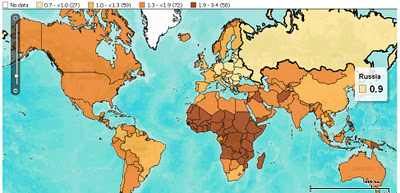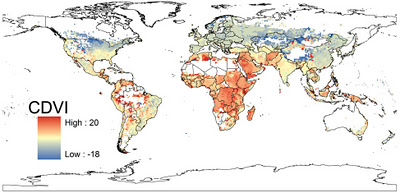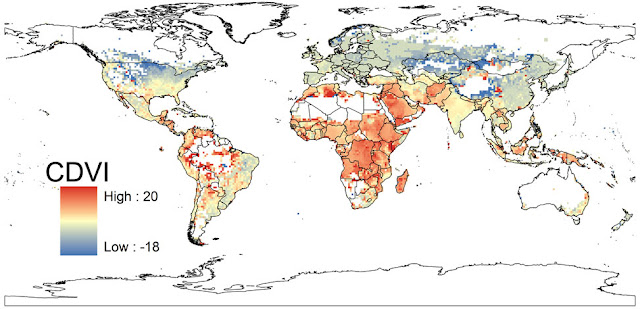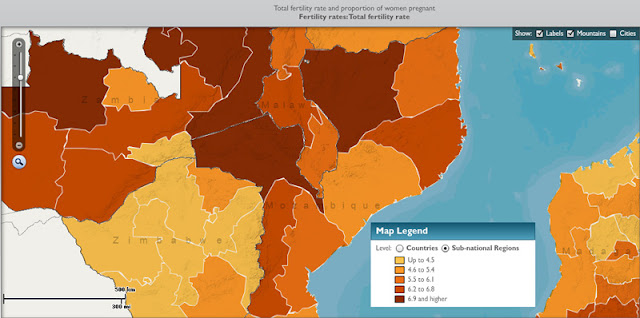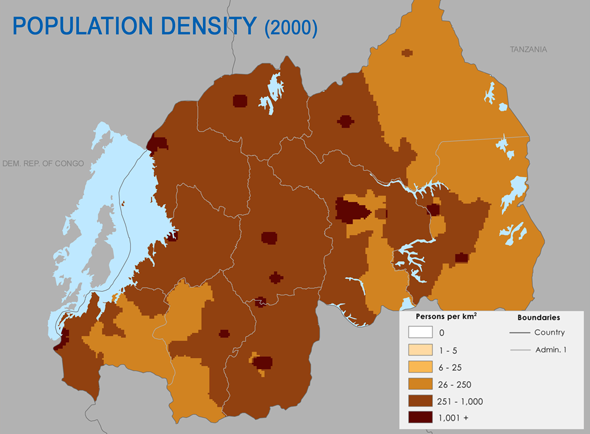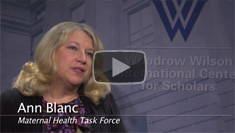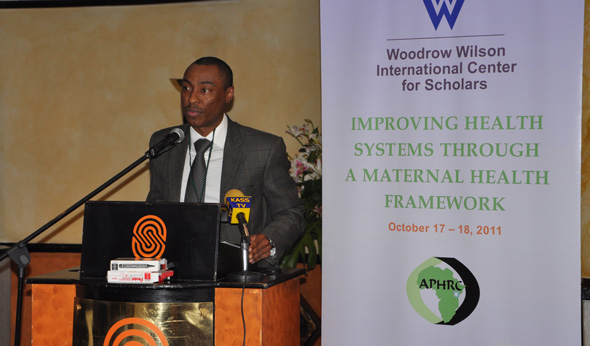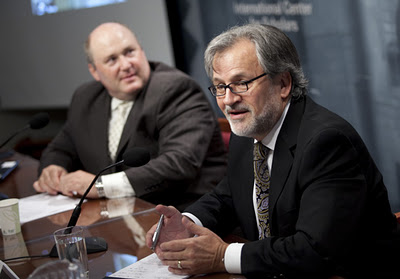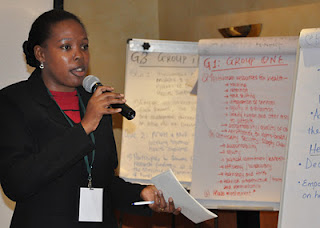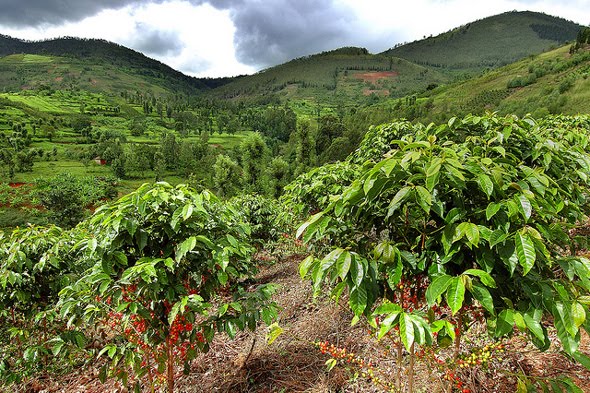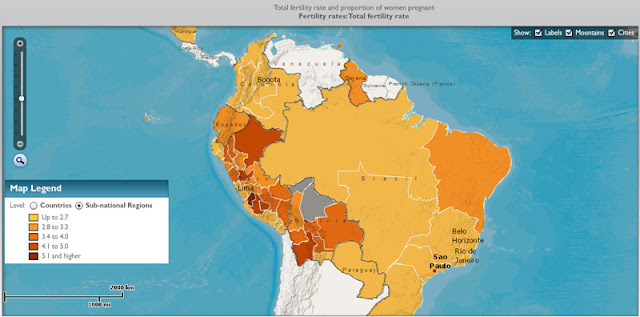-
Twin Challenges: Population and Climate Change in 2050
›

 With global population reaching 7 billion, a lot of attention has been paid to the question of how to sustainably support so many people, much less the 9 billion expected by 2050, or the 10 billion possible by 2100. Add in the environmental variability projected from climate change and the outlook for supporting bigger and bigger populations gets even more problematic. Two new maps – one by the Population Reference Bureau (PRB), the other by McGill University PhD candidate Jason Samson – show how the world might change over the next 40 years in the face of these twin challenges.
With global population reaching 7 billion, a lot of attention has been paid to the question of how to sustainably support so many people, much less the 9 billion expected by 2050, or the 10 billion possible by 2100. Add in the environmental variability projected from climate change and the outlook for supporting bigger and bigger populations gets even more problematic. Two new maps – one by the Population Reference Bureau (PRB), the other by McGill University PhD candidate Jason Samson – show how the world might change over the next 40 years in the face of these twin challenges.
Nine Billion in 2050
PRB’s map, built using their DataFinder tool, shows the world in 2050 in terms individual country growth rates between now and then. Japan, Russia, and countries in Eastern Europe are set to grow more slowly than anywhere else, and some of that group will actually shrink by 10 to 20 percent of their current size. Western, Central, and Eastern Africa will be home to the highest increases. Niger’s 2050 population is expected to be 340 percent its 2011 size – the largest growth of any country.
The map is based on country-level data pulled from a number of sources: the UN Population Division’s latest “World Population Prospects,” the UN Statistics Division’s “Demographic Yearbook 2008,” the U.S. Census Bureau’s International Database, and PRB’s own estimates. It’s unclear what numbers come from which sources, though it is clear that PRB’s 2050 estimates span the UN’s range of medium, high, and constant-fertility variants. In spite of these variations, none of PRB’s estimates come anywhere near the UN Population Division’s low variant estimates.
PRB’s map, echoing its 2011 World Population Data Sheet, shows a world where sub-Saharan Africa will bear the brunt of population growth. The average country in Africa in 2050 is projected to be slightly more than twice its 2011 size; the average European country is expected to barely break even. Africa is home to more countries whose populations are estimated to least double (34) or triple (4) than any other continent. Europe, meanwhile, is home to more countries whose populations will stagnate (8), or even shrink (19), than anywhere else. Interestingly, the Caribbean is a close second in terms of countries whose populations are projected to stay the same (seven to Europe’s eight), and Asia is second to Europe in terms of countries whose populations are projected to shrink (Georgia, Japan, Armenia, South Korea, and Taiwan).
More People, More Climate Change, More Vulnerability
Samson’s map takes on the same time period but projects where people will be most vulnerable to the effects of climate change. Since his map takes into account population growth (measuring where people are most vulnerable, remember), unsurprisingly, Africa, the Middle East, Southeast Asia, and central South America are covered in bright red dots, indicating high vulnerability. Conversely, North America, Europe, and much of Central Asia are in shades of blue.
Samson built his index using four environmental predictors – annual mean temperature, mean temperature diurnal range, total annual precipitation, and precipitation seasonality – taken from WorldClim’s 2050 forecasts, and 2005 sub-national population data from Columbia’s Center for International Earth Science Information Network. In spite of the sub-national population data, Samson makes a point to justify his use of supranational climate data in order to best reflect “the scale at which climate conditions vary.” He writes that localized issues like urbanization and coastal flooding “are probably best investigated with targeted regional models rather than by attempting to modify global models to include all factors of potential regional importance.”
Samson’s research shows that, generally, people living in places that are already hot will be more vulnerable to climate change over time, while people in more temperate climates will feel a negligible impact. Though he projects the largest real temperature changes will happen in temperate climates like North America and Europe, the comparatively smaller changes in Africa, the Middle East, Southeast Asia, and central South America are expected to have a greater impact because those regions are already very hot, their natural resources are stressed, and they are expected to bear the brunt of population growth over the next few decades.
These findings reflect a disparity between those responsible for climate change and those bearing the brunt of it, which, although not surprising, “has important implications for climate adaptation and mitigation policies,” said Sampson, discussing the map in a McGill press release.
Sub-National Data “Present a Very Different Picture”
Though they offer a useful approximate glimpse at what the world might look at in 2050, both of these maps fall prey to over-aggregation. By looking at national rather than sub-national data, we miss how nuanced population growth rates can be within a country. Stimson Center Demographer-in-Residence Richard Cincotta wrote in a recent New Security Beat post that “national level comparisons of total fertility rates tend to communicate the false impression of a world with demographically homogeneous states.” Sub-national data, including differences between urban and rural areas and minority-majority fertility rates, “present a very different picture.”
And that difference matters. When it comes to looking at how population interacts with other issues, like the environment, poverty, and conflict, the importance of a sub-national approach becomes evident. In its 2011 data sheet, PRB writes that “poverty has emerged as a serious global issue, particularly because the most rapid population growth is occurring in the world’s poorest countries and, within many countries, in the poorest states and provinces.”
Edward Carr, an assistant geography professor at the University of South Carolina currently serving as a AAAS science fellow with USAID, argues that national-level data obscures our ability to understand food insecurity as well. The factors that drive insecurity “tend to be determined locally,” writes Carr in a post on his blog, and “you cannot aggregate [those factors] at the national level and get a meaningful understanding of food insecurity – and certainly not actionable information.”
The same is true when it comes to climate vulnerability. In a report from The Robert S. Strauss Center’s Climate Change and African Political Stability Program, authors Joshua Busby, Todd Smith, and Kaiba White write that “research announcing that ‘Africa is vulnerable to climate change,’ or even ‘Ethiopia is vulnerable,’ without explaining which parts of Ethiopia are particularly vulnerable and why, is of limited value to the international policy community.”
“It is of even less use to Africans themselves, in helping them prioritize scarce resources,” add Busby et al.
Understanding the joint problems of climate change and population growth on a global level helps frame the challenges facing the world as it moves toward 8, 9, and possibly 10 billion. But knowing the ins and outs of how these issues interact on a local level will be a necessary step before policymakers and others can hope to craft meaningful responses that minimize our vulnerability to these challenges over the coming decades.
Sources: Center for International Earth Science Information Network at Columbia University, Climate Change and African Political Stability Program at the Robert S. Strauss Center, McGill University, Population Reference Bureau, UN Population Division, UN Statistics Division, U.S. Census Bureau, University of South Carolina, WorldClim.
Image Credit: “2050 Population As a Multiple of 2011,” courtesy of PRB; CDVI map used with permission, courtesy of McGill University; Sub-national total fertility rates in Southern Africa, courtesy of MEASURE DHS, arranged by Schuyler Null. -
Rwanda: Dramatic Uptake in Contraceptive Use Spurs Unprecedented Fertility Decline
›November 8, 2011 // By Elizabeth Leahy Madsen
With over 400 people per square kilometer, the highest rate on the African mainland, population density is perhaps the most widely-discussed factor of Rwanda’s demography. Some scholars, notably Jared Diamond, have argued that it played a primary role in sparking the 1994 genocide through competition for land (although others present a more complex theory based in policies and governance).
-
Watch: Ann Blanc on Finding Unique Partnerships to Address Maternal Health Needs
› In the last five years, maternal health has begun to take a front seat within the larger global health agenda, but when it comes to a neutral space for broader focusing and prioritizing efforts there is still a void. In 2008 the Gates Foundation created the Maternal Health Task Force (MHTF) in an effort to fill that void. In this interview with ECSP, former MHTF Director Ann Blanc discusses how collaboration with the Wilson Center and the United Nations Population Fund has created an ideal space for addressing the technical, programmatic, and policy sides of neglected maternal health issues.
In the last five years, maternal health has begun to take a front seat within the larger global health agenda, but when it comes to a neutral space for broader focusing and prioritizing efforts there is still a void. In 2008 the Gates Foundation created the Maternal Health Task Force (MHTF) in an effort to fill that void. In this interview with ECSP, former MHTF Director Ann Blanc discusses how collaboration with the Wilson Center and the United Nations Population Fund has created an ideal space for addressing the technical, programmatic, and policy sides of neglected maternal health issues.
“Part of our mandate,” Blanc noted, “is to bring in the perspective of what we call ‘allied fields.’” The Wilson Center’s Advancing Policy Dialogue to Improve Maternal Health series focuses on engaging with neglected and emerging topics and experts, finding connections and encouraging partnerships with other fields, such as those working in water, sanitation, or HIV/AIDS services.
For instance, a two-day conference last year with private meetings and public dialogues focused on the neglected issue of transportation for women seeking maternal health services. The conference brought together non-traditional actors, including transportation engineers and mobile technology experts, to identify common barriers mothers commonly face like lack of infrastructure, poor security, or limited access to emergency communications.
“We’re constantly trying to push those barriers and look for interconnections between different development sectors and maternal health,” Blanc concluded. -
Improving Maternal Health: A Conversation With Kenyan Field Workers and Policymakers
›“The traditional strategies for improving the health system include the horizontal approach, which prioritizes non-communicable diseases, and the vertical approach which prioritizes communicable diseases such as HIV/AIDS,” said John Townsend, vice president of reproductive health programs at Population Council, during a webcast discussion – the second in a series – between the Woodrow Wilson Center in Washington, DC, and maternal health experts in Nairobi, Kenya. [Video Below]
Recently, a third strategy, called the “diagonal approach,” was developed to more clearly define health system priorities and guide general system-wide improvements. Participants in both locations discussed this new approach and other structural improvements that can be made to better integrate maternal health indicators into developing country health systems on October 17.
The meeting was part of the 2011 Advancing Dialogue on Maternal Health series, with the Wilson Center’s Global Health Initiative and the African Population and Health Research Center. Participants in Nairobi were assigned to three topical groups and asked to identify challenges and opportunities related to their themes.
The Role of Policymakers and Funders
“We must engage [policymakers and donors] in forums like this one to share findings and share lessons learned,” said participant Sylvia Bushuru of Kenya as she reported back from the policymakers and funders working group. The group focused on steps required to hold politicians accountable to commitments made to maternal health, such as the Abuja Declaration, which requires the Ministry of Finance to dedicate 15 percent of the budget to health. Currently, only 5.5 percent of the Kenya budget is dedicated to the health sector.
Identifying strategic partners will help in reaching ambitious goals, the group agreed; however, they noted that it’s important to ensure that these partnerships and policies extend to an operational level. Besides the overall budget pledge, important steps like ensuring 24-hour emergency health facilities in rural areas and implementing a results-based financing plan based on maternal health indicators have yet to be completed.
A Definition of Priorities through a Diagonal Approach
James Wariero, a regional health advisor with the MDG Centre for East and South Africa, served as the representative for the group discussing the “diagonal approach,” which focused on how maternal health indicators can best set priorities to improve the overall health system. They identified antenatal care visits as a priority because they also serve as an entry point to other health services, including HIV/AIDS treatment.
Discussing gender, he said that “male involvement in maternal health will have benefits for child health and other issues…it is an area with little headway here in Kenya and other similar countries in Africa.” Additionally, Wariero discussed how the diagonal approach could be used to link maternal health indicators with other sectors such as technology and information systems.
The group said that improving the health system should start at the district level to ensure the most vulnerable populations at the community level have proper access. However, they said that ideally district-level programming should be evaluated and funded through results-based financing and structured on clear maternal health indicators.
Knowledge Gaps and Research Needed
“We initially began our discussion surrounding the [World Health Organization’s] six health system blocks,” reported Dr. Kristine Kisaka, a program officer with Deutsche Stiftung Weltbevoelkerung and representative from the “knowledge gaps and research needed” group. This group identified access to mobile phones for maternal health data collection as a major resource gap. Instead of calling for additional research they said they would prefer better implementation of existing, evidence-based programming.
Utilizing the World Health Organization’s health system framework, the group identified existing knowledge gaps to improve maternal health in Kenya and six recommendations:- Strengthen community strategies through a national synchronization of information
- Harmonize planning and implementation of the provisioning of supplies and commodities at the community level
- Address inequalities in the distribution and delivery of health services, ensuring distribution to urban and rural centers, including slums
- Centralize health financing in order to reach both national and community levels
- Empower households in financing, including both women and men, so they plan and save for maternal health
- Address the imbalance in supply and demand of healthcare workers
Linkages: Key To Improving Maternal Health Systems
“It’s really about linkages,” said John Townsend, giving closing remarks after the presentations from Nairobi. Maternal health indicators can be a catalyst for change, due to their strong cross-cutting links to other development systems, such as transportation, the economy, and education. “I think the call to action that the Kenyan working groups made is quite valuable,” he said, but the question is, “How do we get intelligent decision alternatives in front of our leaders to figure out what are the best investments given the critical resources?”
“The private sector [presents] an opportunity,” said Townsend. “I think we need to be more explicit about how we want to engage with them and what we would like to see from them.” He pointed out that the national maternal health strategy in Kenya is explicit and promising, but there needs to be stronger links between the national strategy and the operational aspects of actually implementing it.
Event Resources:- Photo gallery
- Presentation: “Improving Health Systems Through a Maternal Health Framework,” African Population and Health Research Center
- Video
Photo Credit: #1 and #3, courtesy of Jonathan Odhong, African Population and Health Research Center; #2 courtesy of David Hawxhurst/Wilson Center. -
Pascal Gakwaya Kalisa, PHE Champion
Coffee Farmer and Extension Manager Promotes Improved Health and Livelihoods in Rwandan Coffee Communities
›
This PHE Champion profile was produced by the BALANCED Project.
Mr. Pascal Gakwaya Kalisa has produced coffee in the densely populated country of Rwanda for the past nine years. A proud member of the 1,200 member Maraba Coffee Cooperative in Huye District in the Southern Province of Rwanda, Kalisa knows that a larger income alone does not ensure a better quality of life for his fellow coffee farmers and their families. He also knows that a successful coffee growing/exporting enterprise depends on preserving the fragile Rwandan soils, as well as on the health and well-being of farming families and communities. Therefore, Kalisa and other cooperative members treat the land and trees with a level of personal care that is necessary for optimum organic production and soil preservation.
Kalisa and the community have set up small, garden-sized coffee farms that are more productive than usual. Cooperative washing stations have enabled the small-scale farmers to improve product quality, and the cooperatives themselves are learning to negotiate better coffee prices with international buyers. Through such efforts and the support of many international donors and industry partners, Rwanda has become a producer of high quality specialty coffee since 2005, and its coffees are being marketed through renowned coffee roasters and importers in the United States, Europe, and Japan. In just six short years, Rwandan farmers have doubled their incomes and created 2,000 jobs, and the first renowned specialty coffee competition Cup of Excellence in Africa was held in Rwanda in 2008.
SPREAD: A Community Partnership
Recognizing the broad-based health, social, and economic needs of coffee farmers and their families in this part of East Africa, the U.S Agency for International Development initiated the Sustaining Partnerships to Enhance Rural Enterprise and Agribusiness Development project (SPREAD) to provide rural cooperatives and enterprises involved in high-value commodity chains with both appropriate technical assistance and access to health-related services and information. It is this combination of technical assistance and health-related outreach and services that has resulted in increased and sustained incomes and improved livelihoods.
Kalisa and other members of various cooperatives that SPREAD supports recognize that not only should farmers and their families preserve the land, but they must also preserve their own health in order to perform the labor needed to farm the crop that will produce the steady stream of high quality coffee upon which their livelihoods depend. Initiating community dialogues around issues such as protected sex, gender roles, and how coffee revenue is spent within households has also been crucial to project success among both youth and adults.
In his role as coffee zone coordinator for the SPREAD project, Kalisa works with coffee cooperatives to implement improved agricultural practices that improve the quality of their crop. This includes using cleaner environmental practices during coffee processing, such as introducing composting of coffee cherry pulp. Kalisa also helps disseminate integrated health and coffee messages through a weekly coffee talk-show produced by the National University of Rwanda’s Radio Salus, called Imbere Heza (“Bright Future”). In one show, for example, a man explained to a fellow farmer that to get good coffee cherries, he should thin his trees to renew his plantation.
Integrating Healthy Lives
Kalisa has also helped the SPREAD project’s health team deliver integrated messages on family planning, maternal and child health, alcohol, nutrition, gender issues, and the linkages between these. He uses examples such as the one about tree thinning to explain that families that space their children tend to be healthier, as they can plan the number of children to better fit with the financial and natural resources at hand.
Kalisa sees the benefits of using community agents to deliver integrated health, environment, and livelihood messages. This includes training extension agents to discuss environmental and human health issues in the context of coffee growing. Also, having coordinators from the coffee program and the health program go hand-in-hand to the field saves time, fuel, and other project costs. Kalisa believes that this campaign to educate coffee farmers and their families on the linkages between human health, a healthy environment, and strong livelihoods will lead to long-term change in their behavior, attitudes, and knowledge – change that will help them live better lives today and into the future.
This PHE Champion profile was produced by the BALANCED Project. A PDF version can be downloaded from the PHE Toolkit. PHE Champion profiles highlight people working on the ground to improve health and conservation in areas where biodiversity is critically endangered.
Photo Credit: “Rwanda photos 060,” courtesy of David Dewitt/counterculturecoffee. -
STATcompiler: Visualizing Population and Health Trends
›World population is growing – earlier this week, the global community symbolically marked the arrival of the seven billionth person. But the unprecedented growth in global population over the last few decades has not affected everyone equally – in 1950, 68 percent of the world’s population lived in developing regions; today that number is 82 percent. MEASURE’s latest version of their STATcompiler tool helps visually highlight areas simultaneously experiencing the most demographic change and poor health indicators.
The revised STATcompiler – released in September – provides new ways for users to visualize data by generating custom data tables, line graphs, column charts, maps, and scatter plots based on demographic and health indicators for more than 70 countries. Users can select countries or regions of interest, and relevant indicators, including for family planning, fertility, infant mortality, and nutrition. Tables can be further customized to view indicators over time, across countries, and by background characteristics, such as rural or urban residence, household wealth, or education. In some cases, sub-national data is available. User-created tables and images are then exportable so that they may be easily used in papers or presentations.
Since STATcompiler is still in active development, certain functions are still being added. HIV data has not yet been integrated into the program, nor has the express viewer function, with customizable, ready-made tables for quick access. Additionally, updated information is not available for all countries, in all categories – for instance, the most recent data available for Mexico comes from a 1987 survey. If preferred, the legacy version remains available to users in the meantime.
MEASURE DHS – the Monitoring and Evaluation to Assess and Use Results Demographic and Health Surveys project – provides technical assistance for data collection on health and population trends in developing countries. Their demographic and health surveys, funded by USAID, provide data for a wide range of monitoring and impact evaluation indicators at the household level in the areas of population, health, and nutrition. They have become a staple data source for researchers, and the addition of better analysis functions and dissemination tools, via STATcompiler, will hopefully help advance understanding of demographic and health trends.
Image Credit: Map from STATcompiler, arranged by Schuyler Null. -
New Report Launched: ‘The World’s Water’, Volume Seven
›“The water problem is real and it is bad,” said MacArthur “Genius” Fellow and founder of the Pacific Institute Peter Gleick at the October 18 launch of the seventh volume the institute’s biennial report on freshwater resources. “It’s not bad everywhere, and it’s not bad in the same way from place to place, but we are not doing what we need to do to address all of the different challenges around water.”
“The World’s Biggest Problem”
Worldwide, more than a billion people lack access to safe drinking water, while two and a half billion lack access to adequate sanitation services. “This is the world’s biggest water problem,” said Gleick, “the failure to meet basic human needs for water – it’s inexcusable.”
Gleick predicts that the world will fail to meet the Millennium Development Goals for water and sanitation by 2015, and noted that measures of illness for water-related diseases are rising, rather than falling.The World’s Water series provides an integrated way of thinking about water by exploring major concepts, important data trends, and case studies that point to policies and strategies for sustainable use of water. Volume seven includes chapters on climate change and transboundary waters, corporate water management, water quality challenges, Australia’s drought, and Chinese and U.S. water policy. The new volume also includes a set of side briefs on the Great Lakes water agreement, the energy required to produce bottled water, and water in the movies, as well as 19 new and updated data tables. An updated water conflict chronology looks at conflicts over access to water, attacks on water, and water used as a weapon during conflict.Peter Gleick on climate change and the water cycle.
Despite the added data, Gleick said that vast gaps remain in our knowledge and understanding about water. We lack accurate information on how much water the world has, where it is, how much humans use, and how much ecosystems need, he said. “So right off the bat, we are at a disadvantage.”
Focus on Efficiency, Infrastructure to Better Manage Water
One of the major concepts that has connected various volumes of The World’s Water is the concept of a “soft path for water” – a strategy for moving towards a more sustainable future for water through several key focus points: improved efficiency, decentralized infrastructure, and broadly rethinking water usage and supply.
Other cross-cutting themes include climate and water, peak water, environmental security, and the human right to water (formally recognized in a 2010 UN General Assembly resolution). “I would argue that all of these combined offer to some degree a different way of thinking about water, an integrated way of thinking about water,” Gleick said.
The China Issue
The role of China has been one of the most significant changes over the course of the series, said Gleick. The growth in the Chinese economy has led to a massive growth in demand for water (see the Wilson Center/Circle of Blue project, Choke Point: China), as well as massive contamination problems. The newest volume addresses these issues as well as China’s dam policies – internally, with neighboring countries, and around the world.
Gleick pointed out that China is one of the only nations (maybe the only) that still has a massive dam construction policy, and their installed capacity is already much larger than the United States, Brazil, or Canada. In addition, Chinese companies and financial interests are involved in at least 220 major dam projects in 50 countries around world. These projects have become increasingly controversial, for both environmental and political reasons, he said.
“My lens is typically a water lens,” Gleick said, but “none of us can think about the problems we really care about, unless we think about a more integrated approach.” Gleick emphasized the need for new thinking about sustainable, scalable, and socially responsible solutions. “We have to do more than we are doing, in every aspect of water,” he concluded.
Event Resources
Photo Credit: “Water,” courtesy of flickr user cheesy42. -
Bring the Water-Energy Nexus to Rio+20
›Global demand for energy will increase 30 percent by 2030, according to estimates, but in regions that are experiencing rapid economic growth, the increased demand for energy will lead to increased demand for water. The conflicting nature of achieving both water and energy security is exacerbated by a lack of institutional policy frameworks that integrate both concepts. However, the upcoming UN Rio+20 Sustainable Development Conference could provide an opportunity to change that.
Breaking Down Sustainability
Despite its emerging importance as an international relations concept, sustainability has been fragmented to reflect different economic, environmental, social, and cultural agendas. The lack of a common framework is reflected in the disjointed understanding of the water and energy nexus. More often than not, water-basin committees are only consulted when energy decisions are related to hydropower, and they are left out of consultations about alternative energy sources and land planning, even though such decisions have a direct impact on water resources.
Other examples of energy decisions impacting the water sector include the Canadian oil sands, where extraction techniques can consume 20 times more water than conventional oil drilling; irrigated first-generation and soy- and corn-based biofuels, which consume thousands times more water than traditional oil drilling; and solar thermal electricity, as opposed to photovoltaic electricity, which consumes twice as much water as a coal power plant. According to the Wilson Center/Circle of Blue Choke Point project, China will need perhaps 20 billion cubic meters of water a year (5.3 trillion gallons) over the next decade to meet its expanding coal power needs. Meanwhile, from 2000 to 2009, China’s total water reserves fell 1.5 percent annually.
Bring It to Rio
Is this a zero-sum, Kobayashi Maru-like scenario then? It doesn’t have to be if we expand our understanding of sustainability.A holistic understanding of the water-energy nexus is already present in regional documents such as the Organization of American States’ Declaration of Santa Cruz+10. The declaration recognizes that to be sustainable, every aspect of a nation – its energy matrix, water resource management, emergency planning, forest management, and governance – needs to be addressed to reach true sustainability. The nexus is also discussed in other documents such as the Stockholm Statement, but what is truly needed is a place on the agenda of the UN sustainable development conference next year in Rio de Janeiro.OnEarth Magazine’s Ben Jarvey at SXSW Eco.
Most of the major groups of the UN Division for Sustainable Development have released statements supporting the incorporation of the water-energy nexus within the Rio+20 discussions; these groups represent children and youth, women, free trade unions and businesses, scientists, and indigenous communities. The European Union has already established the water and energy nexus as one of the main challenges for the green economy. However, many of the key players within the negotiation process, including the United States, Brazil, India, and China, have not included the water-energy nexus in their official position papers.
To gather the support of these remaining actors, representatives of the Major Groups must advocate for the proposal at the national level. For example, the U.S. Senate is reviewing the Water and Energy Integration Act of 2011 (S.1343). If this bill were to be approved, it will be easier to push for the inclusion of the nexus approach in the official U.S. position paper for Rio+20. Civil society must aim to build domestic support for the inclusion of the water-energy nexus and a whole system approach before the third UNCSD Preparatory Committee Meeting, where the overall agenda for Rio+20 will be set. The inclusion of the nexus in the final agenda will only be possible if true engagement and dialogue between state and non-state actors is developed prior to the conference.
Although it is only one step, the incorporation of the water-energy nexus in the Rio agenda would help to expand our understanding of sustainability, in as official a way as possible, to encompass its truly cross-sectoral reach. Given the importance that the previous Earth Summit had for developing sustainable development goals, global leaders need to take this opportunity to incorporate the water and energy nexus into new discussions to validate its importance as a sustainability concept. This is essential to promote and deliver comprehensive frameworks at a local and regional level that account for the intricacies of an interconnected world.
Olimar Maisonet-Guzman is a 2011 Boren Fellow to Brazil and a member of the SustainUS Youth Delegation that will participate in the Rio+20 Earth Summit.
Sources: Council of the European Union, GovTrack.us, Organization of American States, UN Development Programme, UN Environment Programme, World Economic Forum, World Policy Institute, World Water Week.
Image Credit: Adapted from UNSCD 2012 official logo.
Showing posts from category development.


